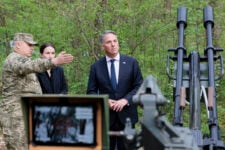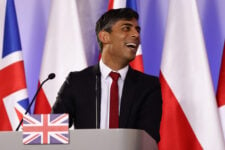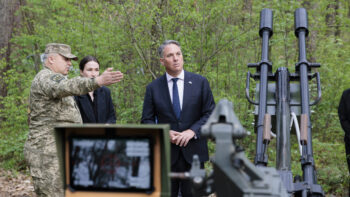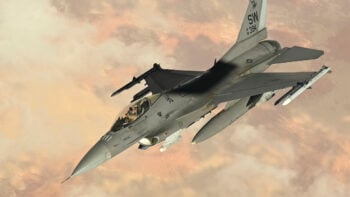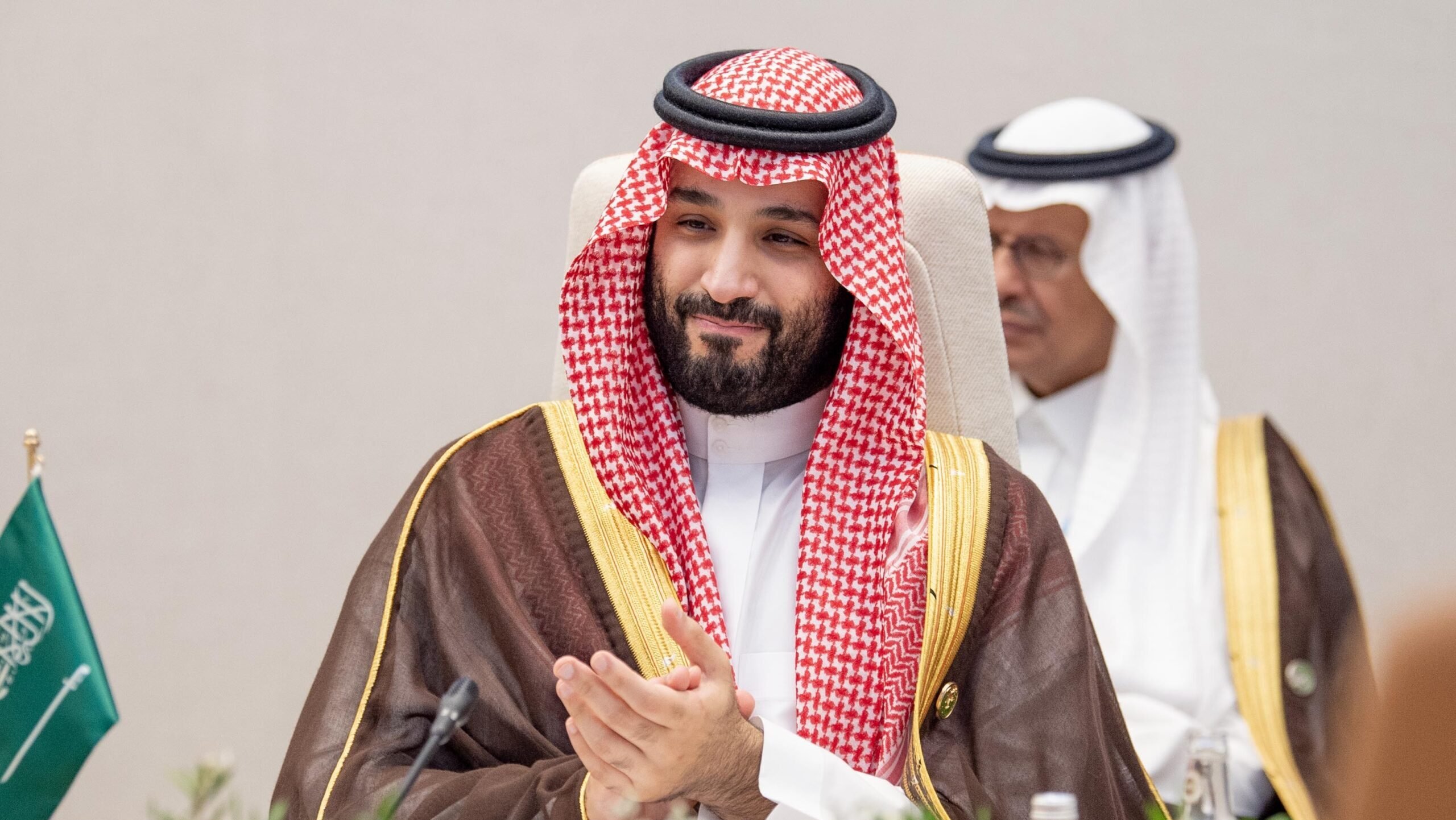
Mohammed Bin Salman, Prime Minister and Crown Prince of Saudi Arabia, seen in a 2022 file photo. (Royal Court of Saudi Arabia/Anadolu Agency via Getty Images)
DUBAI — With Saudi Arabia making clear its desire for nuclear power, the Middle East could find itself on the edge of a potential nuclear arms race — one in which the Kingdom attempts to play the great powers off each other in order to achieve its goals.
Right now, the Kingdom is nowhere near having a operative nuclear program. But Saudi Crown Prince Mohammed bin Salman raised eyebrows in a late September interview when he said that if Iran were to get a nuclear weapon “we will have to get one.”
The timing of MBS’ statement was noteworthy for many analysts who believe it reflected a growing concern of the advancement of the Iranian nuclear program and to capitalize on the push by Washington and Tel Aviv to normalize relations with Riyadh by making the establishment of a Saudi nuclear program with full fuel cycle as a conditional step.
The Saudis do not currently have an active civil nuclear program, “barring a single research reactor at the King Abdulaziz City for Science and Technology that remains dormant,” said Hasan Al Hasan, a research fellow for Middle East at the International Institute for Strategic Studies.
However, for Saudi Arabia establishing an advanced nuclear program is a strategic objective to bolster its status as an Arab and Muslim power, and to achieve a power-balance with Iran. And earlier this year, Saudi officials announced that significant amounts of uranium were discovered in the Kingdom, and they intend to establish a fuel cycle. And on Sept. 25, the Kingdom alerted the international atomic energy watchdog IAEA that it has accepted its demands for comprehensive safeguards, which indicates Riyadh’s readiness to advance its nuclear program.
RELATED: Any Saudi-Israeli normalization requires clearing major security, defense roadblocks: Experts
“Saudi Arabia possesses [a portion] of the global uranium reserves and therefore it has the right to have a uranium enrichment capability that fulfills the requirement for a full peaceful nuclear program for the Kingdom,” said Hassan Alshehri, a Saudi defense analyst and retired Brig. Gen. from the Saudi Armed Forces.
The concern among nonproliferation advocates: there is no reason to think the Saudis will be content with keeping the program purely civil, especially after MBS’ public statements about seeking a bomb.
Daryl Kimball, executive director of the US-based Arms Control Association, summed up the tenor of the discussion in a recent op-ed by stating that, “Saudi Arabia’s brazen nuclear weapons hedging is a profound threat to the global nonproliferation regime that the United States has led for decades… the United States must seek a legally binding Saudi commitment not to pursue or acquire enrichment and reprocessing technology. Such technology is unnecessary for the kingdom’s future nuclear energy or commercial pursuits.”
Given MBS’ statement, there seems to be little doubt among experts that given a civil nuclear program, the Kingdom would seriously consider nuclear weapons.
“Besides satisfying Saudi Arabia’s energy needs, a civil nuclear programme could provide the basis for a Saudi nuclear weapons capability should the Saudis choose to weaponize in the future” in retaliation to an Iranian nuclear breakout, said Al Hassan.
“The Kingdom has been working for some time to confront the Iranian design. Saudi Arabia sees itself as the main target of the Iranian plan to hegemonize the region. That is why when MBS says Saudi Arabia will acquire a nuclear weapon if Iran obtains one, it should be taken as a serious statement,” said Khalid Al Dakhil, a prominent Saudi columnist and assistant professor of political sociology in King Saud University.
Potential Nuclear Partners In China Or Russia?
The first step the Saudis are seeking is to leverage of the Israeli talks to have the US help jumpstart a domestic nuclear program with the same capabilities granted by the West to Iran under the 2015 agreement: namely the ability to mine and enrich uranium, albeit with limits and outside monitoring.
“They (Saudis) want to get US support to enrich uranium with the option to develop a nuclear weapon if they need to later on,” Kenneth Katzman, senior adviser at the Soufan Group, said.
“MBS has put a heavy price tag for the normalization with Israel including the capability for domestic enrichment,” Ahmad Hashemi, a research fellow at the Hudson Institute, told Breaking Defense.
The Biden administration very much wants to get the Israel-Saudi deal done in order to give the president a foreign policy win heading into the 2024 elections. But the nuclear issue could prove just one of a number of sticking points, including pushing a security agreement through the US Congress.
“I don’t think KSA-Israeli normalization is imminent because even if Saudi Arabia manages to get an approval from the US congress — almost impossible — and secure advanced weapons like the F-35 jets, there is no way Israel would agree with Saudi Arabia to enrich uranium in exchange for normalization,” Hashemi said.
“It will be extremely difficult to get approval from Congress for a binding security pact with Saudi Arabia,” Katzman said.
And if that’s the case, it is possible the Saudis will try to pressure the US by bringing in the competition.
“The West knows that Riyadh has a flexible compass that can guide it to other alternatives to acquire nuclear capabilities if Washington continues with its current negative stance,” added Alsheri.
“If MBS and the Biden administration fail to reach an agreement on nuclear limits and security commitments, however, then Saudi Arabia will likely turn to other partners, notably China and Russia, for help with building the capabilities it needs to restore the balance of power with Iran,” Al Hassan said.
The China National Nuclear Corp. has reportedly submitted this year a bid to build nuclear power plants in Saudi Arabia, a move seen by some observers as a message by the Kingdom to the West that it has other options to access nuclear technology. China already helped Saudi Arabia develop a ballistic missile program, a likely delivery vehicle for any possible future nuclear warheads.
“He (MBS) is sort of sending a warning to the United States to make sure that Iran does not obtain a nuclear weapon even if it means military action or extensive US action to prevent Iran from acquiring a nuclear weapon” Katzman told Breaking Defense. “He (MBS) is not confident that the US is committed to doing whatever is necessary to prevent Iran from acquiring a nuclear weapon.”
“Prince Mohammed bin Salman reaffirmed that Saudi Arabia will not stand idle if Iran crosses the nuclear threshold,” said Alshehri. “Saudi Arabia is worried that Iran might have come very close to building a nuclear weapon.”
The Biden administration has been trying to negotiate a new nuclear deal with Iran to replace the one signed in 2015, which former President Donald Trump pulled out from in 2018. Several rounds of talks in the past three years have failed to seal a deal. Nevertheless, reports continue to surface of behind-the-scenes negotiations hosted by Oman to broker a deal that would freeze uranium enrichment by Tehran that has reached high levels and enough quantities to place Iran’s nuclear program close to the nuclear threshold level.
Australia tops up Ukraine military aid with $100M
Australia has already supplied Ukraine with 120 Bushmaster vehicles, six 155mm howitzers, 56 M113 armored vehicles, 14 special operations vehicles and its signature cardboard drones.
